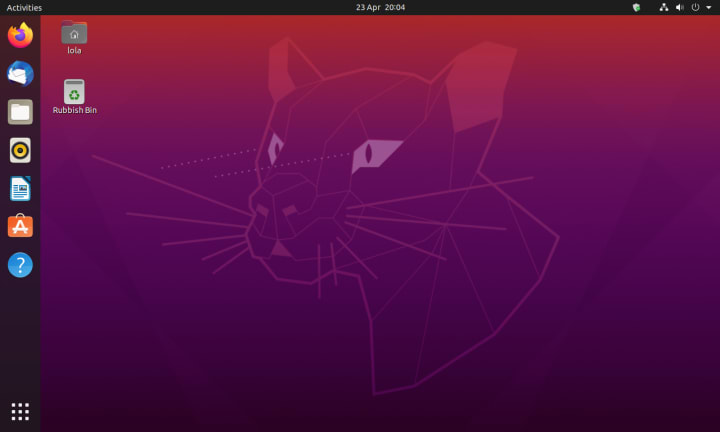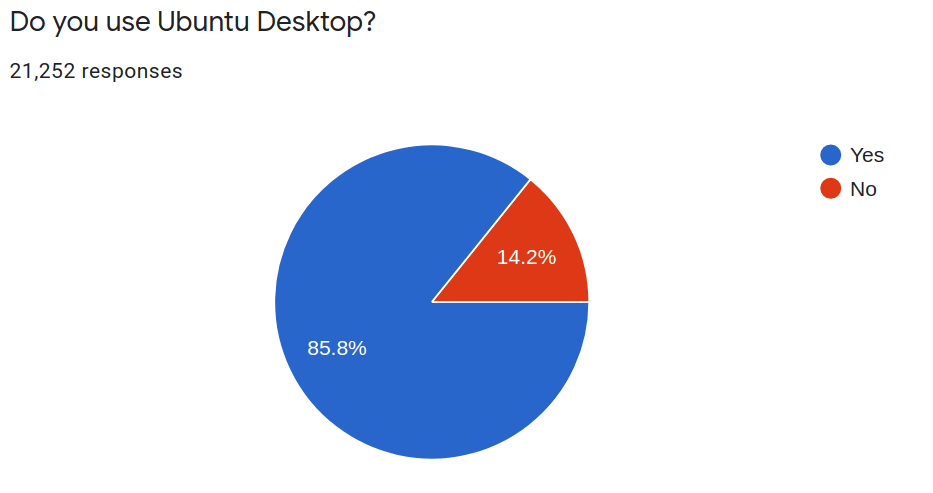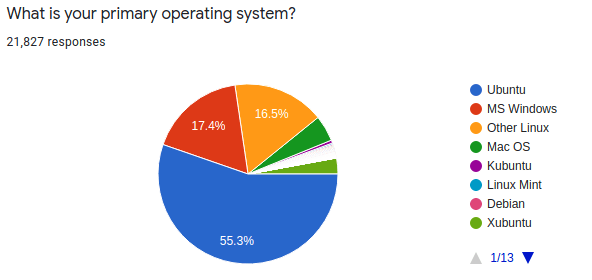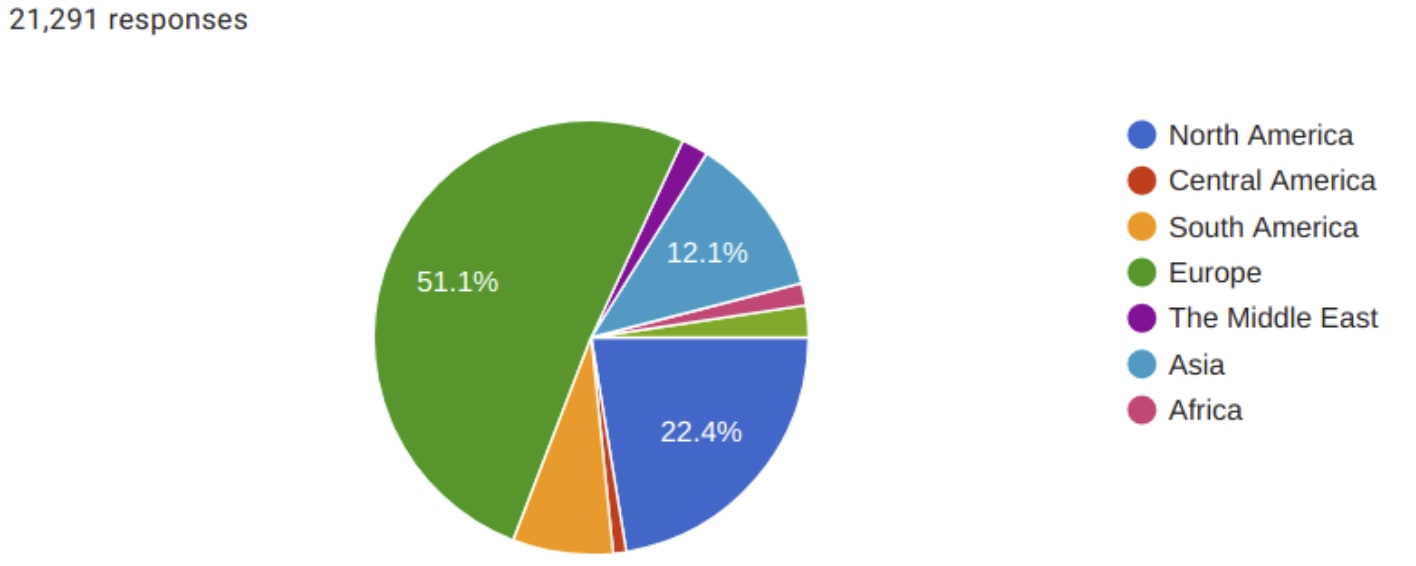Ubuntu 20.04 survey results
Rhys Davies
on 22 April 2020
In December 2019, we asked you what you thought were the most important things for us to include in Ubuntu 20.04 LTS (now live!) 21,862 people took the survey, and have since become a part of our decision-making processes. We would like to thank each and everyone who spent their time to take this survey, upon its close, the results were taken to the relevant engineering teams to support, or discourage, 20.04 decisions. Going forward, the results will remain a source of information for what the community wants. This blog will discuss the biggest trends, key findings and how we have, or will, incorporate them into Ubuntu going forward.

Key Findings
To extract high-level results, we collaborated with ‘Monkey Learn’ for sentiment analysis, keyword extraction and keyword classification. But having asked open-ended questions, we made sure to read deeper into the stories being told. The following is a list of the most common findings along with what we have done, or are going to do, about them.
GNOME
GNOME proved as controversial as expected. It is an open-source graphical user interface (GUI) and set of desktop applications used in various Linux distributions. Two years ago we made the switch from the Canonical-developed Unity desktop environment to GNOME 3.28. The move was controversial in the community but was made because ultimately people were already using GNOME and liked what they had. Our efforts in Unity were seen as fragmentation, not innovation.
The general consensus in the survey around GNOME is that it should be updated (we assume that means kept up-to-date in each release) and improved (through ongoing contribution upstream) for 20.04, to make life easier for the users. Approximately 30% of responses regarding the desktop environment asked for the return of Unity. While approximately 80% (some asked for Unity while also acknowledging our decision to invest in GNOME) were simply asking for GNOME improvements, or for consistency.
Ubuntu 20.04 is shipping with the latest GNOME 3.36 version. Among other things, This release boasts an improved shell theme, new lock screens, a do not disturb toggle feature, and an improved settings panel.


Popular application requests
The answers to the question, “What do you wish Ubuntu would do to make your life easier?” was easily the most varied. But it is also where we found the most interesting stories and insights. Reading through, we quickly came to the conclusion that a lot of people were asking for popular, proprietary applications.
Adobe Photoshop (Illustrator®, Acrobat and Creative Cloud®) were asked for over a hundred times. Mathworks and Autodesk tools came up just less than that, and Microsoft office applications were mentioned or requested a few hundred times. In fact, often these applications were mentioned as the primary reason why people ‘stick with Windows’. Some other popular apps tools came up too, though less frequently, Lightroom, Steam and Instagram.
In relation to the whole survey, these numbers are pretty small. And without anything else to compare them to, it’s hard to determine their significance. However, bringing these kinds of tools and applications to Linux is an ongoing effort. Long time users will have seen a steady influx of bigger, closed source apps over the last few years. The likes of Spotify, Skype, Slack, VSCode, etc. You can follow the efforts of our snap teams at snapcraft.io.

Support and Managed
Time and again, the words “support” and “managed” came up in responses. Over the past two years, we’ve added managed services and support for both Kubernetes and OpenStack – two technologies that are extensively developed with Ubuntu Desktop and then run on Ubuntu Server. Earlier this month, we released a new product – Canonical’s Managed Apps – offering a fully managed service for 10 popular cloud-native apps, on any conformant Kubernetes. Check out this webinar on how businesses benefit from Managed Apps now.
Games
Exactly 1,280 people spoke about gaming in some form, be that playing, streaming, developing, or something else game-related. People saw it as a major technological growth area, something that would make their experience better, and it was cited as the key reason some participants don’t use Ubuntu. The vast majority asked for support or improvement in what Ubuntu can do for gamers.
In 20.04 Feral Interactive’s GameMode performance tool will be installed by default. GameMode is a Linux daemon that enables games to request things like more CPU power, I/o priority and other optimisations. This will make Linux games much smoother and give Linux gamers a better experience. Also, for a while now updates for proprietary Nvidia drivers have been added to the LTS. In 20.04 this will still be the case and the UI around presenting and selecting these drivers will improve.

ZFS
ZFS is an advanced file system that can do more and has more interesting features than a typical file system. It was mentioned or commented on approximately 226 times. Everyone who did comment agreed that we are on the right track and support and development of ZFS will make their lives easier.
In 20.04, we upgraded to the latest available ZFS version which brings performance enhancement and optional encryption support for system administrators managing their system manually. We also implemented basic experimental integration and support of consistency features. Via zsys, we have automated system state saving when installing/upgrading/removing software, as well as automated, on a schedule, user state saving. This allows you to revert to any system state on boot and go back in time for a reliable, robust, operating system.
Snaps
Our sentiment analysis revealed something quite interesting with snaps. There was an almost even split between negative, neutral and positive comments at 30.1%, 33.5% and 36.3%, respectively. For those who don’t know, snaps are a software deployment and package management system built by Canonical as an easily updatable way to package software. They are designed to be secure and work across Linux distributions, clouds, IoT devices, and on the desktop. You can install any application in the snapstore, the app store for Linux, with a click or command.
Overwhelmingly the prevailing request for the survey was ‘MORE’, i.e. get more snaps. While the majority of negative comments came with regard to desktop apps and snap performance. In 20.04 we continue work on performance improvements. This has been an ongoing effort for some time addressing start-up time, general performance, building your own and general improvements.

Community predictions
There were a number of questions where we asked for predictions, what you thought we should do next? Where the largest growth areas would be? etc. And there was some stand out winners.
AI/ML
Artificial intelligence and machine learning practices are overwhelmingly the most common prediction for the next big thing. Of the thousands of people who answered the question: ‘What do you see as the next major technological growth area in the next two years?’, approximately 50% made reference to AI/ML explicitly. It’s difficult to give exact numbers here as a lot of responses were ‘I don’t know’ or simply ‘-’. Reading further though responses that didn’t mention AI/ML explicitly, certainly implied its growth.
Canonical’s way of addressing AI is by natively shipping Kubeflow on both of its Kubernetes distributions; MicroK8s and Charmed Kubernetes. A platform to make leveraging cloud assets (public or on-prem) for AI/ML workloads easier. Kubeflow is a community-driven project that recently made its 1.0 release. Throughout the lifetime of 20.04 and beyond you can expect to see more involvement in bringing AI/ML technology to Ubuntu users.

IoT
Alongside and as well as AI, predictions associated with IoT (the Internet of Things) came up in approximately 25% of responses to our forecasting questions. And that’s not including references to robotics, 3D printing or specific ‘smart’ IoT devices.
Following the release of 20.04 will be the launch of Ubuntu Core 20 (UC20). Ubuntu Core is the minimal, secure by default version of Ubuntu for embedded systems. And is our answer to the growing injury that is IoT. The majority of IoT related responses discussed the prediction that devices or appliances of some kind will be a big part of the future. We agree. Canonical is continually working towards improving the Ubuntu experience for general IoT and robotics.
Canonical is also doing what it can to ensure that everyone will be able to engage and benefit from the Internet of Things. All of the improvements coming in Ubuntu server benefit the IoT developers out there, and Canonical continues to work with and certifies the Raspberry Pi with Ubuntu so makers, tinkerers and developers all have the best experience making with Ubuntu.

‘Cloud X’
Cloud, something, was another popular response to the next major technological growth area. Cloud gaming, services, storage, integration, applications, hybrids and so on and so on. This response linked heavily with the AI responses mentioning topics like Kubernetes, cloud to edge computation, 5G and generally faster computation.
The answers all tend towards being able to do more using cloud computing. Canonical does a lot of work to ensure that Ubuntu is in the clouds, including our recent launch of Ubuntu Pro, which brings increased security and compliance capabilities. It’s good to see that a user survey such as this validates the work in that field.
Other interesting results
Several questions in the survey were just contextual, to identify the demographics taking the survey. And some were asked with the intention of identifying specific features or pieces of feedback that we may have missed.
Demographics
Without getting unnecessarily personal, we asked four questions to get an idea of who was answering our questions. The first was something we asked everybody. ‘How much do you like Ubuntu?’. With approximately 96% of the 21,872 respondents giving a non-negative response, it’s easy to see that the survey was taken by Ubuntu users.

Then, anyone who said that they used Ubuntu in one form or another was asked whether they used Ubuntu Desktop. As you can see here, 85.5% of the respondents said they did. The others either use Ubuntu Server or Ubuntu Core, exclusively.

Though, amusingly, when people who answered yes to using the Desktop were asked ‘what would you like to see the Ubuntu Desktop do in the next two years?’, the answer that came up the most was crystal clear:

We then asked the same people, what their primary operating system was at work. Interestingly, a large percentage of the respondents, though Ubuntu users, used Windows as their primary OS. Given the number of people who said they use Ubuntu Desktop, this could mean people who use Ubuntu Server or Core exclusively use Windows, or Mac OS as their primary operating system.

Finally, towards the end of the survey, we asked whoever stuck with us, what their job was. In an unexpected twist 16.9% of respondents, approximately 3,416 people, use Ubuntu and work in finance.

Geography of responses
At Canonical, we are often guilty of declaring that Ubuntu has a global community of users. It’s nice to acknowledge that sometimes. Of the 21,291 people who made it to the last page, 51.1% were from Europe, 22.4% from North America, 12.1% from Asia and the rest were from elsewhere. The spread is more or less fit expectations, and given that the survey was only released in English, this feels like a good result.

Amazon app removal
Removing the amazon web app that rarely saw any use had been in the plan for 20.04 for a long while. In the latest release, it was just a shortcut that opened a locale-specific version of Amazon in a new tab. The vast majority of responses to the survey didn’t mention the app, but some passionate people made a point of it. To the one responder who liked the app, fear not, your web browser should still load amazon just fine.
Favourite flavour
This was a multiple-response question so that our users could select as many of the flavours as they like. Hence the odd percentages. However, it seems like a good measure of popularity. With ‘Official Ubuntu’ taking the lead with 85.4% of respondents using it, Kubuntu, Xubuntu and Ubuntu MATE, all came pretty close to the second spot.

Conclusion
The aim of this survey was to identify features and trends that we might be missing. Fortunately, many of the insights align well with what we have planned. We understood there would be controversy around certain topics, but it’s good to see we seem to be on the right side of the fence. Users tend to agree on where the world of technology is going, and the Ubuntu user base continues to be diverse, distributed and responsive. There were some surprises in the results such as low awareness of using Ubuntu for IoT. But we will address that soon. It gives us somewhere to concentrate our development efforts and our promotional effort. Going forward, we will use the results to make our decisions. A big thank you to all participants, we are very grateful for your feedback!

Talk to us today
Interested in running Ubuntu in your organisation?
